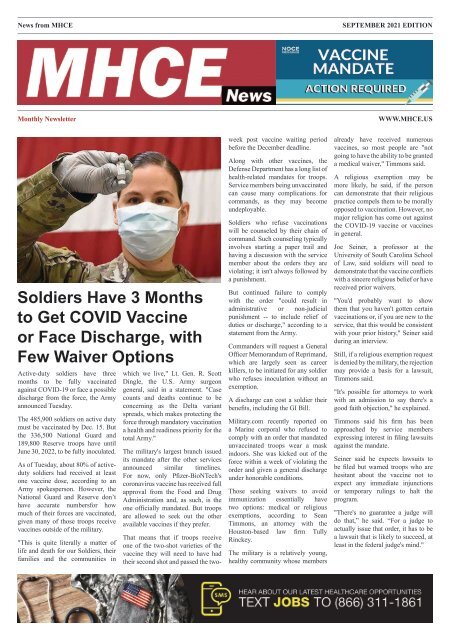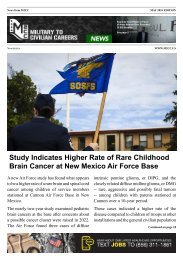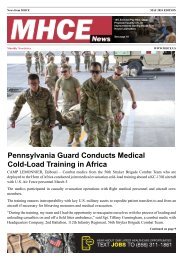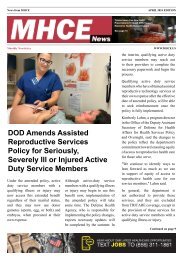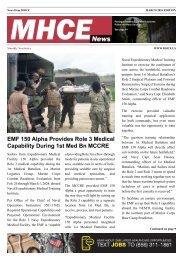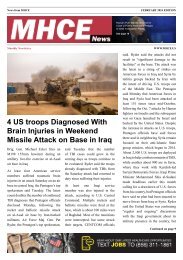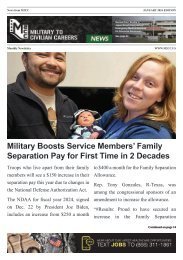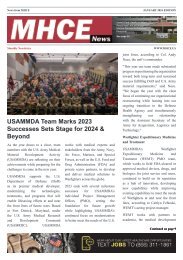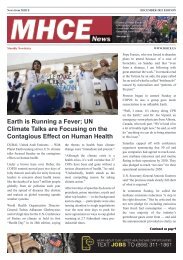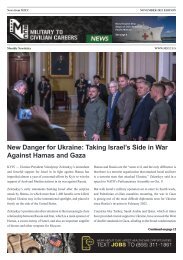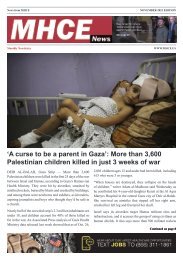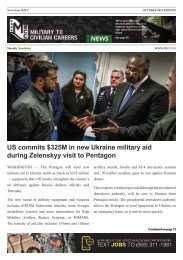Create successful ePaper yourself
Turn your PDF publications into a flip-book with our unique Google optimized e-Paper software.
News from MHCE<br />
SEPTEMBER <strong>2021</strong> EDITION<br />
Monthly <strong>Newsletter</strong><br />
WWW.MHCE.US<br />
Soldiers Have 3 Months<br />
to Get COVID Vaccine<br />
or Face Discharge, with<br />
Few Waiver Options<br />
Active-duty soldiers have three<br />
months to be fully vaccinated<br />
against COVID-19 or face a possible<br />
discharge from the force, the Army<br />
announced Tuesday.<br />
The 485,900 soldiers on active duty<br />
must be vaccinated by Dec. 15. But<br />
the 336,500 National Guard and<br />
189,800 Reserve troops have until<br />
June 30, 2022, to be fully inoculated.<br />
As of Tuesday, about 80% of activeduty<br />
soldiers had received at least<br />
one vaccine dose, according to an<br />
Army spokesperson. However, the<br />
National Guard and Reserve don’t<br />
have accurate numbersfor how<br />
much of their forces are vaccinated,<br />
given many of those troops receive<br />
vaccines outside of the military.<br />
"This is quite literally a matter of<br />
life and death for our Soldiers, their<br />
families and the communities in<br />
which we live," Lt. Gen. R. Scott<br />
Dingle, the U.S. Army surgeon<br />
general, said in a statement. "Case<br />
counts and deaths continue to be<br />
concerning as the Delta variant<br />
spreads, which makes protecting the<br />
force through mandatory vaccination<br />
a health and readiness priority for the<br />
total Army."<br />
The military's largest branch issued<br />
its mandate after the other services<br />
announced similar timelines.<br />
For now, only Pfizer-BioNTech's<br />
coronavirus vaccine has received full<br />
approval from the Food and Drug<br />
Administration and, as such, is the<br />
one officially mandated. But troops<br />
are allowed to seek out the other<br />
available vaccines if they prefer.<br />
That means that if troops receive<br />
one of the two-shot varieties of the<br />
vaccine they will need to have had<br />
their second shot and passed the two-<br />
week post vaccine waiting period<br />
before the December deadline.<br />
Along with other vaccines, the<br />
Defense Department has a long list of<br />
health-related mandates for troops.<br />
Service members being unvaccinated<br />
can cause many complications for<br />
commands, as they may become<br />
undeployable.<br />
Soldiers who refuse vaccinations<br />
will be counseled by their chain of<br />
command. Such counseling typically<br />
involves starting a paper trail and<br />
having a discussion with the service<br />
member about the orders they are<br />
violating; it isn't always followed by<br />
a punishment.<br />
But continued failure to comply<br />
with the order "could result in<br />
administrative or non-judicial<br />
punishment -- to include relief of<br />
duties or discharge," according to a<br />
statement from the Army.<br />
Commanders will request a General<br />
Officer Memorandum of Reprimand,<br />
which are largely seen as career<br />
killers, to be initiated for any soldier<br />
who refuses inoculation without an<br />
exemption.<br />
A discharge can cost a soldier their<br />
benefits, including the GI Bill.<br />
Military.com recently reported on<br />
a Marine corporal who refused to<br />
comply with an order that mandated<br />
unvaccinated troops wear a mask<br />
indoors. She was kicked out of the<br />
force within a week of violating the<br />
order and given a general discharge<br />
under honorable conditions.<br />
Those seeking waivers to avoid<br />
immunization essentially have<br />
two options: medical or religious<br />
exemptions, according to Sean<br />
Timmons, an attorney with the<br />
Houston-based law firm Tully<br />
Rinckey.<br />
The military is a relatively young,<br />
healthy community whose members<br />
already have received numerous<br />
vaccines, so most people are "not<br />
going to have the ability to be granted<br />
a medical waiver," Timmons said.<br />
A religious exemption may be<br />
more likely, he said, if the person<br />
can demonstrate that their religious<br />
practice compels them to be morally<br />
opposed to vaccination. However, no<br />
major religion has come out against<br />
the COVID-19 vaccine or vaccines<br />
in general.<br />
Joe Seiner, a professor at the<br />
University of South Carolina School<br />
of Law, said soldiers will need to<br />
demonstrate that the vaccine conflicts<br />
with a sincere religious belief or have<br />
received prior waivers.<br />
"You'd probably want to show<br />
them that you haven't gotten certain<br />
vaccinations or, if you are new to the<br />
service, that this would be consistent<br />
with your prior history," Seiner said<br />
during an interview.<br />
Still, if a religious exemption request<br />
is denied by the military, the rejection<br />
may provide a basis for a lawsuit,<br />
Timmons said.<br />
"It's possible for attorneys to work<br />
with an admission to say there's a<br />
good faith objection," he explained.<br />
Timmons said his firm has been<br />
approached by service members<br />
expressing interest in filing lawsuits<br />
against the mandate.<br />
Seiner said he expects lawsuits to<br />
be filed but warned troops who are<br />
hesitant about the vaccine not to<br />
expect any immediate injunctions<br />
or temporary rulings to halt the<br />
program.<br />
"There's no guarantee a judge will<br />
do that,” he said. “For a judge to<br />
actually issue that order, it has to be<br />
a lawsuit that is likely to succeed, at<br />
least in the federal judge's mind."
2 | MHCE - News www.mhce.us SEPTEMBER <strong>2021</strong> EDITION
WWW.MHCE.US Monthly <strong>Newsletter</strong> | 3
4 | MHCE - News www.mhce.us SEPTEMBER <strong>2021</strong> EDITION
WWW.MHCE.US Monthly <strong>Newsletter</strong> | 5<br />
Focus on Oversight a Key for Success at<br />
CoreCivic<br />
In the corrections industry, maintaining high standards of<br />
operation is imperative to meeting the needs of the individuals<br />
in our care. That's why CoreCivic adheres to a stringent set of<br />
guidelines set forth by our own standards, as well as those of our<br />
government partners and the American Correctional Association<br />
(ACA).<br />
Founded in 1870, the ACA is considered the national benchmark<br />
for the effective operation of correctional systems throughout<br />
the United States. To become accredited, a facility must achieve<br />
compliance with ACA mandatory standards and a minimum of<br />
90 percent non-mandatory standards. CoreCivic facilities adhere<br />
to ACA standards, and in 2020, CoreCivic earned an average<br />
ACA audit score of 99.6 percent across all facilities.<br />
Key ACA audit areas include facility personnel, resident reentry<br />
programs, resident safety, health care, and more.<br />
holds our facilities and staff to a high standard. To be able to<br />
represent our facility and receive reaccreditation in person is an<br />
honor."<br />
Adhering to ACA standards is only one part of CoreCivic's<br />
commitment to robust oversight. When government partners<br />
utilize CoreCivic's services, we are held not only to our own<br />
high standards and those of the ACA, but we are often held to<br />
the same or higher accountability of our public counterparts<br />
through stringent government contracts, unfettered access to<br />
our facilities for our partners, and hundreds of on-site quality<br />
assurance monitors.<br />
We provide access to our government partners, with most of<br />
our facilities having government agency employees known as<br />
contract monitors who are physically on-site to ensure we are<br />
operating in line with partner guidelines.<br />
Recently, the ACA held in Nashville, Tennessee, its 151st<br />
Congress of Corrections, an annual convention that brings<br />
together corrections professionals from across the country. In<br />
addition to various workshops and events at the convention, the<br />
ACA Commission on Accreditation also held panel hearings to<br />
award accreditation to correctional facilities that meet the ACA's<br />
rigorous requirements. Listed below are the seven CoreCivic<br />
facilities that earned reaccreditation this year, with mandatory/<br />
non-mandatory scores:<br />
• Bent County Correctional Facility - 100/99.0<br />
• Citrus County Detention Facility - 100/100<br />
• Eloy Detention Center - 100/100<br />
• Lake Erie Correctional Institution - 100/99.3<br />
• Saguaro Correctional Center - 100/99.8<br />
• Stewart Detention Center - 100/100<br />
• Tallahatchie County Correctional Facility - 100/100<br />
"The accreditation process is very important," said Warden<br />
Fred Figueroa from Eloy Detention Center, one of the seven<br />
CoreCivic facilities that was awarded reaccreditation. "ACA<br />
To maintain our own high standards, annual on-site audits covering<br />
all operational areas are administered to ensure compliance with<br />
contractual and regulatory obligations and corporate-mandated<br />
requirements. Each CoreCivic Safety facility is audited by our<br />
internal quality assurance division, which is independent from<br />
our operations division. Facilities are expected to be audit-ready<br />
year-round, maintaining continuous compliance with numerous<br />
applicable standards.<br />
CoreCivic employs 75 staff members dedicated to quality<br />
assurance, including several subject matter experts with extensive<br />
experience from all major disciplines within our institutional<br />
operations.<br />
"A lot of hard work goes into preparing for these audits,"<br />
Figueroa said. "Once they're complete, the staff can see their<br />
accomplishments and feel proud."<br />
Having multiple levels of oversight helps CoreCivic maintain<br />
a safe environment for those in our care. By holding ourselves<br />
accountable to our own high standards, along with our<br />
government partners' and ACA's standards, CoreCivic continues<br />
to be a trusted partner working to better the public good.
6 | MHCE - News www.mhce.us SEPTEMBER <strong>2021</strong> EDITION
WWW.MHCE.US Monthly <strong>Newsletter</strong> | 7
8 | MHCE - News www.mhce.us SEPTEMBER <strong>2021</strong> EDITION
WWW.MHCE.US Monthly <strong>Newsletter</strong> | 9<br />
TO ADVERTISE<br />
contact Nathan.Stiles@mhce.us<br />
VISIT OUR<br />
WEBSITE AT MHCE.US
10 | MHCE - News www.mhce.us SEPTEMBER <strong>2021</strong> EDITION<br />
TO ADVERTISE<br />
contact Kyle.Stephens@mhce.us
WWW.MHCE.US Monthly <strong>Newsletter</strong> | 11<br />
Mandatory COVID<br />
Testing for<br />
Unvaccinated DoD<br />
Civilian Workers to<br />
Start This Fall<br />
The Pentagon will begin regular mandatory COVID-19 testing<br />
of unvaccinated civilian workers this fall, its next step in fighting<br />
the disease after requiring troops to get the shots, Deputy Defense<br />
Secretary Kathleen Hicks said Wednesday.<br />
Hicks said the department is adding stricter monitoring of<br />
its massive workforce of about 700,000 civilians, and also<br />
is considering how to deal with contractors, after President<br />
Joe Biden announced in July his intention to test all federal<br />
employees.<br />
"We're working closely across the department and with<br />
interagency colleagues on the right approach for our contractors<br />
who are present on a routine basis on defense installations to<br />
make sure we have the right strategy for them," Hicks said<br />
during a virtual defense conference.<br />
Civilian employees will be required to provide an "attestation<br />
of testing," meaning they must supply proof of vaccination, or<br />
undergo testing to monitor for the disease, which has killed 436<br />
people in the Defense Department.<br />
More than half of the reported deaths -- 282 -- were civilians.<br />
COVID-19 has killed 96 contractors and 40 service members,<br />
according to the department.<br />
But only about half of the civilian workforce, or 310,669<br />
employees, has been fully vaccinated, the department's data<br />
shows.<br />
The Pentagon is the largest federal agency and one of the largest<br />
civilian employers in the U.S., making its switch to mandatory<br />
testing significant. Businesses, states and health care facilities<br />
across the country also have mandated regular testing.<br />
Last month, Defense Secretary Lloyd Austin ordered all activeduty<br />
troops to be vaccinated, and the military services are in<br />
the process of rolling out rules and timelines. The Pentagon<br />
has said the vaccine mandate is a lawful order and troops face<br />
repercussions for refusing, though it remains unclear whether<br />
it would result in judicial punishment or separation from the<br />
military.<br />
Biden announced the federal employee testing requirement July<br />
29 in an effort to ramp up lagging national vaccination rates as<br />
the Delta variant of the coronavirus first took hold.<br />
"Anyone who does not attest to being fully vaccinated will be<br />
required to wear a mask on the job no matter their geographic<br />
location, physically distance from all other employees and<br />
visitors, comply with a weekly or twice weekly screening testing<br />
requirement, and be subject to restrictions on official travel," the<br />
White House announcement said.
12 | MHCE - News www.mhce.us SEPTEMBER <strong>2021</strong> EDITION<br />
Join Our Team!<br />
Embark on a new career<br />
with Central New York<br />
Psychiatric Center!<br />
Our Team Promotes<br />
Hope, Resilience and Recovery!<br />
Central New York Psychiatric Center is seeking<br />
candidates to fill the following positions;<br />
TO ADVERTISE<br />
contact Kyle.Stephens@mhce.us<br />
Psychiatrists, Psychiatric Nurse Practitioners,<br />
Psychologists, and Registered Nurses.<br />
These positions are available at our Inpatient<br />
Forensic Hospital in Marcy, New York, as<br />
well as our Corrections Based Satellite Units<br />
across the State.<br />
Benefits Include:<br />
• NYS Pension<br />
• Competitive Salaries<br />
• Comprehensive Health Insurance<br />
• Flexible Spending Accounts for<br />
Healthcare & Dependent Care<br />
• Generous Paid Time Off<br />
Contact Us:<br />
315-765-3375 or by e-mail<br />
CNpersonnel@omh.ny.gov
WWW.MHCE.US Monthly <strong>Newsletter</strong> | 13<br />
College-age dependents enrolled in the Tricare Young Adult program will<br />
see an increase in their monthly premiums; however, the amounts vary,<br />
depending on which option they are covered under. For those using Tricare<br />
Young Adult Select, the monthly payment will go from $257 to $265, and<br />
those using Tricare Young Adult Prime will see the monthly payment increase<br />
from $459 to $512.<br />
Tricare Rates Increasing in<br />
2022 for Reservists, Young<br />
Adults, Others<br />
If you are a reservist, young adult or transitioning service member enrolled<br />
in Tricare or a transition health insurance plan, you will probably soon be<br />
paying more for your health insurance.<br />
Recently discharged members with temporary health insurance under the<br />
Continued Health Care Benefit Program (CHCBP) will see their premiums<br />
increase by the largest amount. Enrollees in that program pay premiums every<br />
three months, or quarterly, instead of monthly. That means their premiums<br />
will go from $1,599 to $1,654 for a single person and from $3,605 to $4,079<br />
for a family.<br />
While these rates may seem high, they pale in comparison to what civilians<br />
pay for health insurance. According to the Kaiser Family Foundation, the<br />
average monthly health insurance premium for single coverage in 2020 was<br />
$622; for family coverage, it was $1,778.<br />
Tricare just released the 2022 rates for the Tricare Reserve Select (TRS) and<br />
Tricare Retired Reserve (TRR) programs, as well as for the Tricare Young<br />
Adult and Continued Health Care Benefit programs. Like almost everything<br />
else, the prices will mainly be increasing.<br />
Reservists enrolled in the Tricare Reserve Selectprogram are the lucky ones<br />
in the group and will see their premiums actually go down next year. The<br />
monthly premiums will decrease from $47.20 to $46.70 for single coverage<br />
and from $238.99 to $229.99 for family coverage.<br />
Retired reservists who haven't turned 60 and are covered under the Tricare<br />
Retired Reserveprogram will see the monthly premiums for a single member<br />
increase from $484.83 to $502.32 each month, and those with family coverage<br />
will see an increase from $1,165.01 to $1,206.59.
14 | MHCE - News www.mhce.us SEPTEMBER <strong>2021</strong> EDITION<br />
One Elite Business School,<br />
Multiple Modes of MBA<br />
Delivery<br />
MBA programs at the Harbert College of Business are not<br />
business as usual.<br />
Our accredited programs prepare you for real-world<br />
challenges and strengthens your skills in leadership, critical<br />
thinking, and analysis. You’ll graduate as a globally minded,<br />
ethically conscious professional prepared to inspire business.<br />
delivers a unique learning experience that offers the best of<br />
both worlds. No GMAT requirement for this program.<br />
PHYSICIANS EXECUTIVE MBA<br />
This executive MBA is tailored to practicing physicians,<br />
preparing them to manage the business of healthcare and<br />
move into positions of leadership. It offers the flexibility of<br />
online courses blended with short on-campus residencies,<br />
a learning model preferred by busy physicians. No GMAT<br />
requirement for this program.<br />
Wherever you are in your career, the Harbert College of<br />
Business has an MBA to fit your needs.<br />
We offer multiple highly ranked MBA programs: online,<br />
full-time, executive, and physicians executive. The<br />
programs vary in structure, duration, and requirements, but<br />
all culminate in the same distinguished degree.<br />
Chart your trajectory in the way that works best for you:<br />
FULL-TIME MBA<br />
Our renowned program—hosted at our world-class business<br />
complex—provides an immersive learning experience<br />
tailored to career starters.<br />
ONLINE MBA<br />
THE HARBERT COLLEGE OF BUSINESS MBA<br />
ADVANTAGE<br />
Globally Distinguished<br />
The Harbert College of Business is accredited by the<br />
Association to Advance Collegiate Schools of Business—an<br />
honor held by fewer than 5% of business schools worldwide.<br />
Our most flexible program, the online MBA is a self-paced<br />
alternative for business professionals unable to put their<br />
careers on hold. This program offers the same exceptional<br />
curriculum as the full-time MBA. Our 30 years of online<br />
learning experience and expertise make it one of the top<br />
online MBA programs in the nation.<br />
EXECUTIVE MBA<br />
A blend of online and on-campus learning, the executive MBA<br />
is structured to accommodate mid-to-late career business<br />
professionals. Primarily delivered online for flexibility, this<br />
program also offers students a shared learning experience<br />
through short on-campus residencies. This combination<br />
VISIT OUR WEBSITE<br />
AT MHCE.US
WWW.MHCE.US Monthly <strong>Newsletter</strong> | 15<br />
When the practice of medicine<br />
becomes the business of medicine.<br />
You spent years studying medicine.<br />
But what about the business side of<br />
your practice?<br />
It’s easy to get started.<br />
Take the next step toward a<br />
Physicians Executive MBA<br />
and contact us:<br />
auburn-military.mba<br />
334-844-4060<br />
Auburn MBA
16 | MHCE - News www.mhce.us SEPTEMBER <strong>2021</strong> EDITION<br />
Pentagon 9/11<br />
Attack Survivors<br />
Grappled With<br />
Wounds that<br />
Defined an Era of<br />
War<br />
Army Lt. Col. Marilyn Wills was in a second floor conference<br />
room at the Pentagon on Sept. 11, 2001, unaware of the<br />
tragedy unfolding 205 miles to the north in New York City.<br />
At 9:37 a.m., American Airlines Flight 77 slammed into<br />
the Pentagon's west side, driving deep into the outer row of<br />
offices known as the "E-Ring" and exploding in a fireball that<br />
killed 184 nearly instantaneously and wounded 160 more,<br />
including Wills, who was knocked across the room, hair<br />
ablaze, ears ringing and brain rattled from the blast wave.<br />
"I don't remember any of it," Wills said in an interview. "I<br />
know I was constantly talking, trying to assure us that we<br />
would get out of there. Over the years, you talk to people who<br />
were there, the nurse who attended me, and learn, but I just<br />
don't remember."<br />
Wills earned the Soldier's Medal for her heroism that day,<br />
crawling through inky toxic smoke, using her sweater to<br />
shield her face, sharing it with others to protect their lungs<br />
from the scalding air and, at one point, carrying a person on<br />
her back to reach a window on the building's courtyard.<br />
Then, she helped lower people safely to the ground.<br />
Thirteen days later, after spending time at hospitals for smoke<br />
inhalation and burns, Wills returned to the building. She<br />
didn't realize it then, but she also had suffered at least a mild<br />
traumatic brain injury from the shock wave and later would<br />
develop post-traumatic stress disorder.<br />
"Looking back, I was not ready physically, I wasn't ready<br />
psychologically," Wills said. "The place was still crackling.<br />
The worst part was the smell -- stinky, smelly. It was the<br />
smell of death, of dead bodies, of fuel."<br />
Twenty years after 9/11, Wills and 105 others injured at the<br />
Pentagon still bear the effects of TBIs, lung damage, burns,<br />
musculoskeletal injuries and missing limbs. At least several<br />
have been diagnosed with PTSD or depression.<br />
They were the first of the 9/11 generation to experience what<br />
later were identified as the signature wounds of Iraq and<br />
Afghanistan, mainly brain injuries and post-traumatic stress<br />
disorder caused by roadside bombs -- often the enemy's<br />
weapon of choice in those insurgency wars.<br />
By 2020 -- 19 years after 9/11 -- more than 408,000 service<br />
members had suffered traumatic brain injuries, according to<br />
Reuters, including roughly 8,200 with severe or penetrating<br />
wounds, at least a quarter of whom also reported symptoms<br />
of PTSD.<br />
The injuries existed before the last two decades of conflict,<br />
but those long-running wars meant wide exposure to bomb<br />
blasts and burn pits that have left an indelible mark on the<br />
force.<br />
TBIs can cause memory loss, depression, and changes in<br />
personality and focus. PTSD leaves sufferers fighting similar<br />
symptoms, part of what has made diagnosis challenging<br />
and contributing to the difficulty many veterans face when<br />
coming home to lives put on hold during deployments.<br />
Deeply intertwined with those conditions has been the plague<br />
of suicide that has struck the military community since the<br />
wars in Iraq and Afghanistan began.<br />
But improvements in medical care in the years after 9/11<br />
allowed more wounded service members to survive and<br />
make it home, part of what medical experts such as Dr. Art<br />
Kellermann, former dean of medicine at the Uniformed<br />
Services University of the Health Sciences, call the "greatest<br />
developments in combat casualty care the world has ever<br />
seen."<br />
"The conflict started on Sept. 11, and the reality is the first few<br />
years, the outcomes weren't nearly what was achieved later<br />
in the conflict," said Kellermann, who now works as CEO<br />
at the Virginia Commonwealth University Health System in<br />
Richmond, Virginia. "Those first few years, military medicine<br />
was reinvented."<br />
Since 9/11, 6,710 U.S. service members have died and 52,441<br />
have been wounded in Iraq, Afghanistan and elsewhere as part<br />
of the Global War on Terrorism, not including the injuries and<br />
deaths at the Pentagon.<br />
While each combat death is tragic, the numbers would have<br />
been significantly higher if not for medical innovations and<br />
lessons learned that started at the Pentagon on Sept. 11,<br />
medical experts say.<br />
"It's actually one of the brightest stories of these long-running<br />
conflicts that haven't ended nearly the way our country would<br />
have hoped they would, but the advances that were made, and<br />
how they were made, are as profound as anything American<br />
medicine ever achieved," Kellermann said.<br />
HEAD INJURIES<br />
Traumatic brain injury and PTSD would become incredibly<br />
common but were still little understood at the outset of the<br />
9/11 wars.<br />
The first is physical, the result of blows to the head or pressure<br />
waves sweeping across the brain. The second is categorized<br />
as a mental health condition. Years of research have led<br />
experts to conclude they are connected, but no causal link<br />
has been proven.<br />
Wills and retired Army Lt. Col. Brian Birdwell, the only<br />
survivor from the portion of the Pentagon's E-Ring where the<br />
plane hit, both suffered concussive blasts.<br />
Wills recovered and so did Birdwell, who is now a Texas state<br />
senator.
WWW.MHCE.US Monthly <strong>Newsletter</strong> | 17<br />
"I was injured on the first day of the war," Birdwell told<br />
Military.com. "In the military, we do chaos well. This is what<br />
we have been doing -- adapt, improvise and overcome."<br />
In the oily thick blackness, Birdwell said he came to the<br />
"reconciliation that he was dying," thought of his wife and<br />
12-year-old son, and told God he was ready.<br />
"The battlefield is an inherently toxic, dirty atmosphere,"<br />
Szema said. "There's definitely an opportunity to improve<br />
how we treat those who live and work in these environments."<br />
Both say the road has not been easy. Birdwell has treatable<br />
short-term memory loss, and both admire how far American<br />
medicine has come in recognizing the impact of concussion<br />
on brains and the approach now taken to ensure that those<br />
affected recover.<br />
"I had a huge contusion on the back of my head, and because<br />
I had suffered oxygen deprivation, I had mild cognitive<br />
impairment, but long term, I'm quite healthy," said the<br />
59-year-old Birdwell, who despite his injury could name<br />
every single person who treated and helped him from his<br />
evacuation from the Pentagon to his release from the hospital<br />
at Christmas, more than three months later.<br />
It took several years, but in 2006 the Military Acute<br />
Concussion Evaluation was added to the list of tools to screen<br />
casualties. And while that assessment is based on subjective<br />
questioning, the Defense Department continues to invest in<br />
sensors and medical devices to detect mild brain injuries.<br />
"Fortunately, our capacity to help wounded warriors recover<br />
is substantially better than when the U.S. entered Iraq and<br />
Afghanistan ... those of us who are privileged to work with<br />
these patients and their families remain determined to help<br />
them advance in their recovery," wrote Dr. Paul Pasquina<br />
and others in the book, "Out of the Crucible: How the U.S.<br />
Military Transformed Combat Casualty Care in Iraq and<br />
Afghanistan,” co-edited by Kellermann and published by the<br />
Department of Defense.<br />
MENTAL HEALTH<br />
An estimated 20% of Iraq and Afghanistan veterans have<br />
symptoms of PTSD, according to Rand Corp. Two years after<br />
9/11, Wills found herself short-tempered with her children,<br />
irritable and angry.<br />
Likewise, Birdwell dealt with flashbacks to the blast, the<br />
memories of those in his office who perished, and the pain<br />
and trauma of suffering third-degree burns.<br />
Wills, who has a masters degree in counseling, relied on her<br />
own training at first but later saw a professional, which she<br />
said helped. Birdwell turned to religious counseling and his<br />
own deep faith to get him through the surgeries, the recovery<br />
and the agony of his extensive injuries.<br />
In the early 2000s, Wills said, she feared the loss of her<br />
security clearance and her job if she admitted that she was<br />
struggling mentally. She said that fear continues to exist<br />
today even as Army leaders promote mental health treatment.<br />
"I had to reach back into my box of tools," Wills said. "If I<br />
didn't, I knew I couldn't move forward. I will always share<br />
with young service members ... and senior ranking officers,<br />
my experience and how I was able to deal with it. For leaders<br />
to say 'I understand what you are going through ... you need<br />
to get help.' It helps a lot."<br />
Since Sept. 11, 2001, 5,116 active-duty service members<br />
have died from suicide -- a reflection of the stress of combat,<br />
with roughly 50% of those having deployed to war. But it<br />
also reflects the increase in suicides among young people in<br />
the United States.<br />
And more than 114,000 U.S. veterans have died by suicide in<br />
the past 20 years. The Pentagon and Department of Veterans<br />
Affairs both have struggled to reverse the upward trend,<br />
emphasizing the importance of mental health treatment for<br />
those who need it, offering therapies and alternative care for<br />
struggling personnel, and attempting to destimagize the need<br />
for care.<br />
Birdwell leaned on his faith, religious leaders and spiritual<br />
counseling for the help he needed. He seeks to reassure<br />
veterans dealing with PTSD or injuries that leave them in<br />
constant pain.<br />
"There's a lot of life to be lived," Birdwell said. "Even with my<br />
scars, the things Mel [my wife] and I have seen together, that<br />
laying in that burn center and laying in that ICU wondering if<br />
she would see them as a widow ... we have seen as husband<br />
and wife. There's just a lot of life left."<br />
BURNS AND LUNG DAMAGE<br />
Birdwell was six steps from the men's restroom at the<br />
intersection of the E-Ring and the 4th corridor when the<br />
Boeing 757 struck the Pentagon.<br />
He was knocked to the ground, his clothing, hair and skin<br />
on fire, his lungs filled with jet fuel. One of his eardrums<br />
ruptured, and his brain was rattled by the blast wave.<br />
"In my sinful, impatient human nature, I was like, 'OK, Lord,<br />
I'm ready, let's get on with this thing,'" Birdwell said during<br />
an interview Wednesday. "But that feeling of the soul leaving<br />
the body didn't come."<br />
So, Birdwell, with burns across 60% of his body, got up and<br />
walked while feeling for the wall and following the only<br />
visible light, which was a reflection of ceiling lights on the<br />
corridor's terrazzo flooring.<br />
Fifty-one surgeries later, Birdwell is a skin graft recipient<br />
who has "more pig skin than a football, has coached burned<br />
post-9/11 veterans, and reflects on the miracle that his lungs<br />
somehow function, despite having been drained of jet fuel on<br />
arrival at Georgetown.<br />
"I couldn't smell anything in the ER room, but apparently, it<br />
was like a gas station,' Birdwell said.<br />
The lung damage of both Birdwell and Wills, which now<br />
manifests itself in shortness of breath and a susceptibility<br />
to lung infections, compares with the veterans of Iraq and<br />
Afghanistan who were exposed to burn pits and dust and also<br />
suffer from pulmonary dysfunction.<br />
"I just have a cold all the time. I may be at, what, 80% lung<br />
capacity?" Wills said.<br />
"I try to take the stairs in the Texas State House. But more<br />
than often, I take the elevator. I get really winded," Birdwell<br />
said.<br />
Anthony Szema, a researcher and professor at the Donald and<br />
Barbara Zucker School of Medicine at Hofstra/Northwell in<br />
Hempstead, New York, studies the lung effects of battlefield<br />
pollution such as burn pits, jet fuel, and dust contaminated<br />
with heavy metals and chemicals.<br />
The lung damage among Pentagon victims and first<br />
responders, as well as those close to the collapse of the World<br />
Trade Center towers, is similar to veterans exposed to burn<br />
pits and other contaminants in Iraq and Afghanistan.<br />
Advance Your Nursing Career<br />
Move Beyond<br />
Patient Care<br />
Become a<br />
› Medical Case Manager<br />
› Forensic Nurse<br />
› Legal Nurse Consultant<br />
› Nurse Death Investigator<br />
Earn a Professional Certificate ONLINE<br />
from the prestigious University of California.<br />
Discover how to grow your nursing career<br />
online at www.extension.ucr.edu/nurse<br />
or call (951) 827-5104.<br />
The U.S. military has needed more capacity to treat severe<br />
burns during the 9/11 era. The Defense Department in 2012<br />
established a premier burn center at Joint Base San Antonio-<br />
Fort Sam Houston, one that treats service members who<br />
suffer burns and inhalation injuries.<br />
The purpose, said then-Army Lt. Col. Louis Stout, an Army<br />
nurse who worked in San Antonio at the time,, was to ensure<br />
that medical expertise, like treating severe wounds, were not<br />
lost during peacetime.<br />
"These are perishable skills that are not easily, or quickly,<br />
mastered and must be maintained," Stout said at the center's<br />
inauguration.<br />
Birdwell and others who have been severely injured would<br />
have died or had lower quality of life without treatment from<br />
top burn specialists and skills being taught at San Antonio,<br />
such as using maggots to clean burns.<br />
"The Lord's nastiest, if not His least creation, knows only to<br />
eat the dead cells, not the living cells," Birdwell said. "If not<br />
for them, my liver might have shut down. The next step would<br />
have been to amputate my arms to protect from infection. I<br />
still have my arms."<br />
Kellermann, the former dean of medicine, worries about the<br />
future of military medicine after the U.S. military withdrew<br />
from Afghanistan and fewer troops are deployed in combat,<br />
and whether it will be ready if someday another war comes.<br />
"I'm really worried that we will have another one of these<br />
learning curves and we'll pay for it in lives," Kellermann said.<br />
The system and the advancements of the past 20 years must<br />
be preserved, he said.<br />
"They cut the battlefield death rate in half to the lowest<br />
level of world history, while they took care of millions of<br />
beneficiaries at home," Kellermann said of the military's<br />
post-9/11 doctors and nurses. "And that is one of the most<br />
astonishing achievements in the history of American<br />
medicine."
18 | MHCE - News www.mhce.us SEPTEMBER <strong>2021</strong> EDITION<br />
VA Implements<br />
Coronavirus<br />
Vaccine Mandate<br />
for Medical Staff<br />
When it comes to treating patients and<br />
using technology, military healthcare<br />
workers have been there and done<br />
that -- sometimes with missiles flying<br />
overhead and supply lines under threat.<br />
No wonder medical service personnel<br />
have such bright and varied career<br />
prospects once they leave the military.<br />
Valued Backgrounds<br />
In the healthcare job market, where<br />
demand continues to outpace supply,<br />
the armed forces are viewed as a<br />
font of high-quality talent. Military<br />
healthcare providers are in demand,<br />
says Ted Daywalt, president of VetJobs<br />
in Marietta, Georgia. "Their work<br />
environment is much more hostile<br />
and demanding than at a US civilian<br />
hospital," he says, so they're able to<br />
hit the ground running after military<br />
retirement.<br />
Healthcare organizations readily<br />
recognize the value of candidates'<br />
military backgrounds. "Employers<br />
don't question the ability of military<br />
people to deal with high-stress<br />
environments," says John Harol, a<br />
partner at Lighthouse Recruiting in<br />
Avon, Connecticut. Harol, a staff<br />
sergeant in the Massachusetts Air<br />
National Guard, was on active duty<br />
for eight months in Iraq, where he<br />
set up satellite communications for a<br />
hospital.<br />
Military medical personnel have also<br />
seen it all when it comes to patient<br />
care. "In the Navy, I saw thousands<br />
of patients," says Michael Wood, a<br />
military optometrist who retired in<br />
1992 after 20 years to open a private
WWW.MHCE.US Monthly <strong>Newsletter</strong> | 19<br />
optometry practice in Greenville, South Carolina.<br />
"You actually get stranger eye diseases in the<br />
Navy -- more difficult than anything you would<br />
encounter in a civilian practice."<br />
Translating Healthcare Skills<br />
When making the transition to the civilian<br />
workforce, military medical workers face many<br />
of the same challenges other armed services<br />
professionals do. However, "military healthcare<br />
workers have an easier transition into civilian<br />
lifethan do other servicemen and women," Harol<br />
says.<br />
Why is that? "Federal standards and patient load<br />
are the same in the military as in civilian life,"<br />
Daywalt explains.<br />
Also, medical jargon stays the same, as do most<br />
of the procedures and protocols defining the<br />
healthcare professions. "Only job titles and the<br />
names for policies and procedures are different,"<br />
Harol notes.<br />
As all retiring service members must do,<br />
healthcare workers need to mind their language<br />
in resumes and cover letters, as well as in face-toface<br />
interviews, which they should drill for. For<br />
example, a serviceman retiring as a Laboratory<br />
NCOIC (Noncommissioned Officer in Charge)<br />
would be known as a blood-bank supervisor in<br />
civilian healthcare. The Transition Assistance<br />
Program, available to all armed forces members,<br />
can help soldiers, sailors and Marines overcome<br />
this language barrier.<br />
Wide Range of Opportunities<br />
Although many former military healthcare<br />
workers make the transition to civilian hospitals,<br />
there are other choices. "In optometry, you can go<br />
into commercial, private or institutional practice<br />
or research," Wood says. "Retiring from the<br />
military, you're prepared for any of those areas."<br />
Veterans who are medical professionals find<br />
employment in settings ranging from stand-alone<br />
clinics to doctors' offices, rehabilitation centers,<br />
nursing homes, and private or public research<br />
laboratories.<br />
There are also varied healthcare career<br />
opportunities at the Veterans Health<br />
Administration. Jobs are available at VA hospitals<br />
and other veterans healthcare facilities across<br />
the country. Current openings include those<br />
for physical therapists, pharmacists, radiologic<br />
technologists, social workers, registered nurses,<br />
licensed practical nurses, respiratory therapists<br />
and medical technologists.
20 | MHCE - News www.mhce.us SEPTEMBER <strong>2021</strong> EDITION<br />
VISIT OUR WEBSITE AT MHCE.US
WWW.MHCE.US Monthly <strong>Newsletter</strong> | 21<br />
Lawmakers Try to Ban<br />
Dishonorable Discharges<br />
for Troops Who Refuse<br />
Mandatory COVID-19<br />
Vaccines<br />
House lawmakers have<br />
backed legislation prohibiting<br />
dishonorable discharges for<br />
troops who refuse the COVID-19<br />
vaccine, as the Navy gave its<br />
sailors 90 days to get the shot<br />
this week and the Army and Air<br />
Force were poised Thursday to<br />
enforce their own timetables.<br />
Legislation sponsored by Rep.<br />
Mark Green, R-Tenn., an Army<br />
veteran, requires only honorable<br />
discharges for anyone who is<br />
separated from the military over<br />
refusing to be vaccinated. It was<br />
added to the fiscal 2022 defense<br />
authorization bill, passed by<br />
the House Armed Services<br />
Committee on Thursday.<br />
"No American who raises their<br />
hand to serve our Nation should<br />
be punished for making a highly<br />
personal medical decision,"<br />
Green said in a statement after the<br />
committee vote. The U.S. Food<br />
and Drug Administration fully<br />
approved the Pfizer-BioNTech<br />
vaccine in August after allowing<br />
emergency use beginning in<br />
December 2020, saying it is safe<br />
and effective for those 16 years<br />
old and over.<br />
spokesman John Kirby said<br />
during a briefing with reporters<br />
Thursday.<br />
But troops who refuse to be<br />
inoculated may not necessarily<br />
face dishonorable discharge, or<br />
even separation, according to<br />
Kirby.<br />
The Pentagon has repeatedly<br />
stopped short of saying it will<br />
boot troops for refusing the shot.<br />
Commanders will have a range<br />
of options that stop short of<br />
punishment under the Uniform<br />
Code of Military Justice, Kirby<br />
said. The services also will allow<br />
religious exemptions to the<br />
vaccine.<br />
"The secretary expects that<br />
the department leadership will<br />
implement these mandatory<br />
vaccines with skill but also<br />
... professionalism and<br />
compassion," Kirby said. "When<br />
an individual declines to take a<br />
mandatory vaccine, they will be<br />
given an opportunity to talk to<br />
both medical providers as well<br />
as their own chain of command<br />
so that they can fully understand<br />
the decision they are making."<br />
The House legislation barring<br />
dishonorable discharges now<br />
must go to a vote in the full<br />
chamber. The House version of<br />
the massive, must-pass defense<br />
authorization bill also must<br />
be reconciled with the Senate<br />
version in conference, where<br />
controversial measures often are<br />
eliminated.<br />
In any case, the bill is unlikely to<br />
be signed into law until months<br />
after all the military services<br />
are enforcing COVID-19<br />
inoculations.<br />
Military.com reported on a<br />
Marine corporal who said she<br />
was discharged for refusing to<br />
wear a mask, possibly the first<br />
service member to be pushed<br />
out of the military in connection<br />
with COVID-19 rules.<br />
According to the Pentagon,<br />
roughly 63% of all U.S. forces<br />
had received at least one dose<br />
or were fully vaccinated against<br />
COVID-19 as of Aug. 18.<br />
Creating a Culture<br />
of Caring<br />
Offering master’s<br />
and doctoral<br />
degrees for<br />
Registered Nurses<br />
Specialties Offered:<br />
Nurse-Midwife<br />
Family Nurse Practitioner<br />
Women’s Health Care NP<br />
Psychiatric-Mental Health NP<br />
The Navy became the first<br />
service to enforce a timeframe for<br />
vaccinations in a series of memos<br />
on Tuesday and Wednesday<br />
following the FDA approval and<br />
an order by Defense Secretary<br />
Lloyd Austin for all troops to<br />
be vaccinated. The Army and<br />
Air Force are expected to give<br />
soldiers and airmen a deadline<br />
"very, very soon," Pentagon<br />
Learn more at frontier.edu/military
22 | MHCE - News www.mhce.us SEPTEMBER <strong>2021</strong> EDITION
WWW.MHCE.US Monthly <strong>Newsletter</strong> | 23<br />
TO ADVERTISE<br />
contact Kyle.Stephens@mhce.us
24 | MHCE - News www.mhce.us SEPTEMBER <strong>2021</strong> EDITION<br />
College of Nursing<br />
Visit www.southalabama.edu/colleges/con<br />
251-445-9400<br />
5721 USA Drive North, Mobile, AL 36688<br />
High Quality<br />
Programs<br />
Available Online<br />
and on Campus<br />
On Campus:<br />
• Pre-Licensure BSN<br />
• Accelerated BSN<br />
Online OptiOns Offered:<br />
• RN to BSN<br />
• RN to MSN<br />
• MSN<br />
• DNP<br />
• Post Graduate Certificates<br />
areas Of speCializatiOn:<br />
• Clinical Nursing Leader<br />
• Nursing Administration<br />
• Nurse Practitioner<br />
(multiple tracks)<br />
• Clinical Nurse Specialist<br />
• Nursing Informatics<br />
sub-speCialties:<br />
• Cardiovascular<br />
• Oncology<br />
• Palliative Care<br />
• Nursing Education<br />
• Lipid Management


